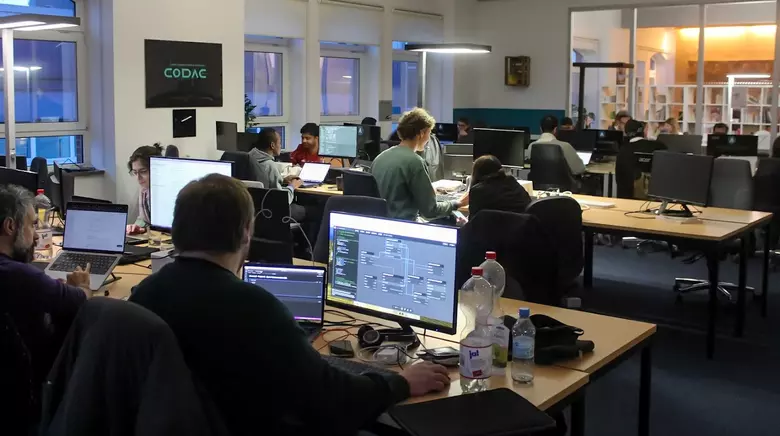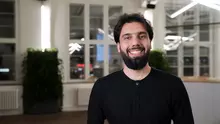Berlin is a magnet for tech talent – it is open, international and diverse. Germany’s capital is where creative energy meets the digital future: over 30 industries are working here on innovations, developing products, platforms and solutions for tomorrow. If you want to enter the tech world or change careers, Berlin not only has the right jobs, but also flexible educational paths.
One of these options is coding schools. They teach in-demand tech skills in just a few months – in a practical, compact way that is closely aligned with the job market. One of the most exciting places in Berlin is Code Academy Berlin, founded in the middle of the coronavirus pandemic by three people who met as colleagues at a Spanish tech bootcamp provider. One of them is Jost Lepère, 43, born in southern Germany, who has lived in Berlin for 15 years.
Jost originally studied politics and history in Greifswald, Germany. His career path took him from working as an employment counsellor at the Federal Employment Agency to a master’s degree in change management and finally to the tech industry. Today he is a co-founder and career coach at Code Academy Berlin – and knows the Berlin job market like no other. In his Academy’s courses, he provides international students with targeted preparation for starting a career in the capital.
In this interview, Jost Lepère explains what makes coding schools special, how they are responding to AI – and why programming is not just a skill but also an attitude. Read the interview now!
What exactly will I learn in a coding school – and who is it suitable for?
At a coding school you will learn practical tech skills in just a few months – without a degree or traditional training. The programmes are aimed at newcomers, career changers and anyone who wants to develop professionally. Courses are offered in web development, data science, cyber security, UX design, online marketing and other tech areas. The aim is to prepare you specifically for the job market.
What requirements do I need to meet?
It really varies. Usually, though, you do not need any previous knowledge. Being motivated and having a clear goal are much more important. At Code Academy Berlin, we hold personal interviews in advance to find out whether your expectations match the content of the course.
Do you also offer English-language courses?
Yes, our courses are conducted entirely in English. Our participants come from all over the world, just like our team. If you have a good B2 or C1 level, you can participate without any problems.
How long does a course at Code Academy Berlin last – and is it possible to attend while working?
Our courses last five months. Full-time courses are most effective, but can also be attended part-time in consultation with your employer. Thanks to the Qualification Opportunities Act, funding is available through the Federal Employment Agency – provided that your job requires additional digital skills.
How practical are the lessons – and how important are soft skills?
The lessons are very practical: we offer two courses – Web Development and Data Science.
Our participants work on five real projects and create an impressive portfolio that will form the basis for future applications. In the process they also learn to work in a team, give feedback and solve problems together – soft skills that are crucial in the world of work. We only offer face-to-face teaching, because personal interaction is a key success factor for us. However, there are also hybrid options or purely online courses available.
What qualification will I have after attending a coding school?
You will receive an in-house certificate of participation. Many coding schools are certified by the Federal Employment Agency – including ours. You will receive a certificate showing the projects and programming languages you have completed.
What are the job prospects after graduation?
The labour market is currently quite challenging, but diverse – especially in Berlin. Our graduates are invited to attend interviews and find jobs. It is important to make contacts, take part in hackathons and maintain your own network.
Start-ups, small and medium-sized enterprises and especially companies undergoing digitalisation are particularly open to new talent.
What makes a coding school particularly attractive for specialists – compared to vocational training or a degree course?
You will quickly gain practical experience and build up a meaningful portfolio – ideal for job applications and case studies in selection processes. In addition, coding schools respond much more quickly to market changes than traditional training courses or degree programmes. This means you acquire exactly the digital skills that are currently in demand.
How much does a course at Code Academy Berlin cost – and what financing options are available?
A course costs an average of €11,000, but is usually fully financed by an education voucher. Alternatively, employers can cover the costs – or you can pay yourself.
How is artificial intelligence integrated into your courses?
The topic of AI is an integral part of the courses. Our participants learn to use and understand AI tools effectively. We prepare them for a future in which AI is commonplace – but human understanding will still be required.
Will AI soon make programming superfluous?
Quite the opposite: AI will take over simple tasks, but the responsibility for developing solutions will remain with humans.
Programmers will increasingly take on advisory roles – they will lead, design and bring together technical expertise and customer focus.
What sets Code Academy Berlin apart from other providers?
We are a community – with small groups, close support and real togetherness. Our trainers are committed and our courses are intensive. We nurture skilled workers and friendships. Because, in my opinion, good learning happens when everyone is on the same level. For example, we also organise joint film evenings and cook for the graduation ceremony.
How do you as an academy support people starting their careers?
We offer a career week with application training, CV optimisation and interview preparation in every course. In addition we cooperate with Berlin companies on hackathons, taster days and networking events. Our alumni community also provides direct information about new job offers, which is a big plus.
What is Code Academy Berlin’s long-term vision?
We would like to make our offerings less dependent on education vouchers. We are currently taking the next step with funding from Google. In the future, we want to establish scholarships and more partnerships with companies to make our programmes even more accessible.
What makes Berlin an ideal location for tech careers?
Berlin is open, diverse and international. The city offers countless opportunities to combine professional interests with personal passions. If you are interested in politics, for example, you can work as a programmer in a foundation. Or as a data analyst in a bicycle store if you are passionate about bicycles. Opportunities open up everywhere – often where you least expect them.
There are alsomany communities and English-language jobs for those starting out, which is particularly interesting for international talent – but if you want to stay long-term, you should also learn German.
You regularly take part in the Berlin Partner Roundtable. What is the Roundtable all about – and what can participants expect at the Hackathon 2025?
The Roundtable brings together Berlin coding schools with representatives from business, politics and Berlin Partner once a quarter. The aim is to recognise trends on the labour market at an early stage and to further develop practical training programmes. This means we know exactly which skills companies are looking for right now – and can prepare our participants accordingly.
One highlight this year is our Hackathon 2025: more than ten coding schools, companies such as DocMorris and, for the first time, universities are taking part. Over the course of 48 hours, participants work on real-life business tasks – and establish direct contacts with potential employers. Some even get job interviews afterwards. It’s a great opportunity for all graduates to enter the tech world!









